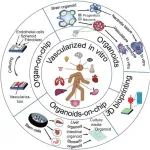(Press-News.org)
In an era marked by rapid technological advancement in biomedical engineering, a groundbreaking development is set to revolutionize our approach to drug testing and disease modeling. Researchers from Shanghai University and the University of California Los Angeles have made significant strides in the field of in vitro vascularized organ-on-a-chip systems, offering a promising alternative to traditional methods that rely heavily on animal testing and simplistic two-dimensional cell cultures.
The organ-on-a-chip technology mimics human organs on a microscale by cultivating cells in a controlled microenvironment that simulates the 3D structure and physiological functions of real tissues. These devices integrate various cell types within a network of tiny channels and chambers, allowing for precise manipulation of both the physical and chemical conditions.
The key to the effectiveness of these organ chips lies in their ability to incorporate vascular systems, which are essential for transporting nutrients, oxygen, and waste products—just like in the human body. This is achieved through sophisticated microengineering techniques such as 3D bioprinting, microfluidics, and the use of hydrogels that support the growth of microvascular networks. These networks are critical for creating more realistic organ models, as they enable the proper function and maturation of tissues, enhancing the chips’ biological relevance and their ability to mimic human responses accurately.
Recent innovations highlighted by the team include various types of organ chips such as those for the liver, brain, and heart, each designed to address specific research questions related to these organs. For instance, the liver chip allows for the study of drug metabolism and disease progression, while the brain chip offers insights into neurodegenerative diseases and the effects of pharmaceuticals on neural tissues.
One of the most significant advantages of vascularized organ-on-a-chip systems is their potential in personalized medicine. By using cells derived from individual patients, these chips can predict how specific patients will respond to different drugs, helping to tailor treatments to individual needs and minimize adverse effects. This could be particularly impactful in the treatment of complex diseases like cancer, where the efficacy and side effects of chemotherapy vary widely among patients.
Moreover, these devices hold the promise of reducing the reliance on animal testing, aligning with ethical considerations and potentially accelerating the drug development process. Traditional animal models often do not accurately replicate human disease states or predict human responses to treatments, leading to inefficiencies and high failure rates in drug development. Organ-on-a-chip technologies could provide a more accurate, ethical, and cost-effective solution.
The researchers also emphasize the role of these chips in studying multi-organ interactions and diseases involving several organ systems. By linking different organ chips through microfluidic channels, it’s possible to study the complex interactions between organs, offering deeper insights into systemic diseases and providing a holistic view of their progression and response to treatments.
In conclusion, vascularized organ-on-a-chip technologies represent a significant step forward in biomedical research, offering a powerful tool for drug testing, disease modeling, and personalized medicine. As these technologies continue to evolve, they promise to transform our approach to medical research, reducing our reliance on animal models, and providing more accurate, ethical, and efficient ways to develop new therapies for a wide range of diseases.
The paper, "Advances in the Model Structure of In Vitro Vascularized Organ-on-a-Chip," was published in the journal Cyborg and Bionic Systems on Apr 25, 2024, at DOI: https://spj.science.org/doi/10.34133/cbsystems.0107.
END
BOSTON—A novel male contraceptive gel combining two hormones, segesterone acetate (named Nestorone) and testosterone, suppresses sperm production faster than similar experimental hormone-based methods for male birth control, according to a new study.
Results from an ongoing multicenter phase 2b clinical trial will be presented Sunday at ENDO 2024, the Endocrine Society’s annual meeting in Boston.
“The development of a safe, highly effective and reliably reversible contraceptive method for ...
BOSTON—Men who illicitly used steroids to boost muscle size and physical performance and have stopped in the past year have impaired sexual function compared with men currently using steroids, according to a study being presented Sunday at ENDO 2024, the Endocrine Society’s annual meeting in Boston, Mass.
Having a psychiatric diagnosis and stopping steroids was associated with greater impairment in sexual function, the researchers found.
“It is important to recognize the symptoms that men experience within the first year of stopping ...
BOSTON—Women experiencing moderate-to-severe vasomotor symptoms face a three times greater risk for metabolic-dysfunction-associated steatotic liver disease (MASLD) compared to those with mild symptom severity, according to research being presented Monday at ENDO 2024, the Endocrine Society’s annual meeting in Boston, Mass.
Vasomotor symptoms include hot flashes or night sweats—symptoms that have become synonymous with menopause.
“This research is significant as it contributes ...
The world of robotics is witnessing a transformative shift with the rise of soft robotics, which offers unparalleled flexibility and adaptability in various applications, from medical interventions to intricate rescue operations. A groundbreaking review article by Zhou et al. published in Cyborg Bionic Systems in 2024, sheds light on this evolution, highlighting the crucial integration of actuation and sensing technologies that pave the way for truly intelligent soft robots.
Soft robots, unlike their rigid counterparts, are made from materials that mimic the mechanical properties of living tissues, allowing them to move and adapt with a life-like grace. This capability makes ...
BOSTON—Almost one out of five breast cancer survivors may experience weight gain of more than 10%, suggests a study presented Monday at ENDO 2024, the Endocrine Society’s annual meeting in Boston, Mass. A number of factors are associated with excessive weight gain, the researchers found.
Factors associated with more than 10% weight gain included a lower weight, younger age, and more advanced cancer stage at cancer diagnosis; hormone-positive breast cancer; mutations of the BRCA2 gene; undergoing more aggressive breast surgery; and the use of chemotherapy and endocrine therapy, the study found.
“Weight ...
An immunotherapy drug given before surgery instead of chemotherapy meant that over ten times more patients with a certain genetic profile were cancer free after surgery, according to clinical trial results presented by researchers at UCL and UCLH.
The findings, presented at the American Society of Clinical Oncology (ASCO) Annual Meeting 2024, are interim results from the NEOPRISM-CRC phase II clinical trial assessing whether the immunotherapy drug pembrolizumab can improve outcomes for patients with stage two or stage three MMR deficient/MSI-High bowel cancer. The ...
About The Study: A stepped-care model, with palliative care visits occurring only at key points in patients’ cancer trajectories and using a decrement in quality of life to trigger more intensive palliative care exposure, resulted in fewer palliative care visits without diminishing the benefits for patients’ quality of life. While stepped palliative care was associated with fewer days in hospice, it is a more scalable way to deliver early palliative care to enhance patient-reported outcomes.
Quote from corresponding author Jennifer S. Temel, M.D.:
“This study demonstrates that early palliative ...
BOSTON – A new study led by investigators from Mass General Cancer Center, a founding member of the Mass General Brigham healthcare system, reveals the effectiveness of more scalable ways of delivering palliative care to patients with advanced lung cancer. The findings were highlighted at the American Society of Clinical Oncology’s annual meeting and are published in JAMA.
The study, led by Jennifer S. Temel, MD of the Mass General Cancer Center, assessed the effectiveness of stepped palliative care, in which all patients receive palliative care for their condition, but with a minimum of required contact with a specialty-trained clinician. ...
Berlin, Germany: Differences in socioeconomic status (SES) are known to be linked to differences in the risk of developing disease. While people with lower SES are more likely to develop complex diseases such as diabetes and cardiovascular disease, those with a higher SES are at increased risk of developing certain types of cancer. Using biobank and national register data, researchers from Finland have now found that people with lower SES (educational achievement and occupation) have a greater genetic susceptibility to develop many other complex diseases such as rheumatoid arthritis, lung cancer, depression, and alcohol ...
CHICAGO – While CAR T cell therapy has revolutionized treatment for many blood cancers, including non-Hodgkin lymphoma (NHL), many patients who receive CAR T cell therapy do not experience a long-term remission. For those whose cancers return or become resistant after CAR T cell therapy, the prognosis is poor, with few options left.
A new “armored” form of CAR T cell therapy, developed by Carl June, MD, the Richard W. Vague Professor in Immunotherapy in the Perelman School of Medicine at the University ...

